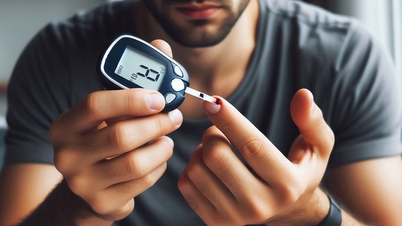'Thanks to containing bioactive compounds such as flavonoids, rosmarinic acid, lemon balm brings many health benefits'. Start your day with health news to see more content of this article!
Start your day with health news , readers can also read more articles: Getting enough sleep but still feeling lethargic, doctors point out the cause and how to fix it; 3 problems after exercising reveal your health status ; 4 warning signs that your body is taking in too much protein...
Unexpected effects of perilla tea are scientifically proven
Lemon balm has long been used in traditional medicine. Thanks to its bioactive compounds such as flavonoids and rosmarinic acid, lemon balm has many health benefits.
Lemon balm is an herb with a light, lemony scent. Research has shown that lemon balm can help reduce anxiety and stress, aid digestion, relieve headaches, and promote heart health.

Lemon balm tea helps you sleep and has many other health benefits.
In particular, lemon balm essential oil has a relaxing and mood-enhancing effect. This benefit is due to the rosmarinic acid compound and flavonoids that have a calming effect on the nervous system, helping to reduce stress and anxiety.
Lemon balm has also been shown to help insomniacs fall asleep more easily. Insomnia comes in many forms. Some people can’t sleep all night, while others don’t get enough sleep, have trouble falling asleep, and often wake up in the middle of the night and toss and turn until morning.
A study published in the Mediterranean Journal of Nutrition and Metabolism found that people who took perilla leaf extract daily had a 42% reduction in insomnia symptoms. Not only that, 85% of the study participants reported a reduction in their insomnia.
The rosmarinic acid content in lemon balm also helps reduce inflammation, lower blood pressure and support better blood circulation. The antioxidants in this plant also protect the cardiovascular system from damage caused by free radicals. The next content of this article will be on the health page on December 26.
3 problems after exercise reveal health status
Soreness is a sign that your workout has provided enough stimulus for your muscles to grow. It usually goes away after a few days. However, if the soreness causes you to feel exhausted, it may be something else.

Persistent muscle pain can be a warning sign of something unusual.
Post-exercise health warning issues that people need to pay attention to include:
Muscle soreness after exercise. Muscle soreness after a workout is caused by intense exercise causing microscopic tears in the muscles. As these tears heal, the muscles grow larger and stronger. People who are new to the gym or who increase their exercise intensity suddenly are especially susceptible to muscle soreness. This condition is called delayed onset muscle soreness (DOMS).
Although not dangerous, muscle pain can be severe and uncomfortable. Exercisers should take plenty of rest and only return to training when the pain subsides. If the pain does not subside after 72 hours or becomes severe, accompanied by dark urine, they should go to the hospital immediately. This is a sign of kidney damage due to rhabdomyolysis.
Excessive fatigue. Feeling tired after a workout is completely normal. However, if you are too tired, you may be suffering from a condition called exercise fatigue syndrome (EFS). People who suffer from this condition not only feel tired but also experience headaches, dizziness, nausea, shortness of breath, increased heart rate, and muscle and joint pain after exercising.
What needs to be done is to rebalance the training regime. The exercises need to be less intense. The practitioner also needs to eat well and get enough sleep so that the body is in good condition when entering the gym. The next content of this article will be on the health page on December 26.
4 warning signs that your body is taking in too much protein
Protein is an important nutrient that helps the body maintain a healthy weight and build muscle mass. People recovering from surgery, exercising intensely, or who are prone to muscle loss due to aging are often advised to eat more protein.

Protein-rich foods are essential for the body, but eating too much can be harmful.
The recommended amount of protein for adults is 0.8 grams per kilogram of body weight. If a person weighs 50 kilograms, the amount of protein they need to consume each day is 40 grams. Eating a high-protein diet for a long time can cause some health problems, especially for people with high cholesterol or kidney problems.
Warning signs that a person is consuming too much protein include:
Foamy urine. Foamy urine is a sign of high protein levels in the urine. This can be a serious warning sign of kidney damage. People should not be subjective if this condition persists with frequent urination.
Dehydration. When protein is metabolized in the body, nitrogen is produced as a byproduct. The kidneys have to work harder to eliminate this nitrogen, resulting in the need for more water. If you do not drink enough water, your body can easily fall into a state of dehydration such as thirst, fatigue, dizziness, lightheadedness, dry skin, and dry mouth. Start your day with health news to see more of this article!
Source: https://thanhnien.vn/ngay-moi-voi-tin-tuc-suc-khoe-phat-hien-them-nhieu-loi-ich-cua-tia-to-185241225233322944.htm












































































































Comment (0)